
Read our 2023 annual report

Knowledge Hub
Nothing that we do would be possible without the skills, talents, and commitments of our country team members and partners, the people who turn your concern into action.
Each year, on World Humanitarian Day, we pause for a moment to recognise the efforts and sacrifices of those who make our humanitarian programs a reality, and to celebrate their work. That work has become even more complex and urgent as a result of the COVID-19 pandemic. Today, we introduce you to six people — 3 staff and 3 partners — who represent the essential spirit of Concern’s mission. They are our heroes.
I think a hero is any person really intent on making this a better place for all people.
Jasmine Augustin - Haiti
I see us as a light for the children
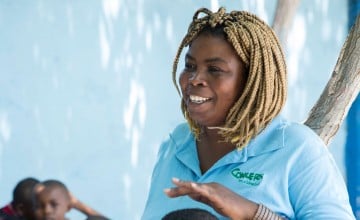
Many of the people who work on Concern programs don’t actually work for Concern, but rather for local partner organisations. Jasmine Augustin is employed by JEDe, a Haitian organisation dedicated to the protection and development of children at risk.
Growing up in the Fontamara neighborhood of Port au Prince, Jasmine spent a lot of time in the community library, reading and learning. In fact, she spent so much time there that the manager eventually assigned her the task of reading aloud with local children and leading them in educational games. It was not something she could ever have imagined as becoming a life mission. “Back then, I didn’t know what commitment was — it was just something I did.”
Nearly two decades later, Jasmine is today part of a grassroots movement to engage and inform Haitian youth in some of the capital’s most disadvantaged neighborhoods. The opportunities for young people to go astray are many, and too often they drift into a life of petty crime or fall victim to exploitation and abuse. “I see us as a light for the children,” she says.
JEDe develops programs that use role-play, games, and communal activities to help young people understand the importance of respect for themselves and others — and to know their own rights and responsibilities. As an Animatuer, Jasmine is constantly interacting with those who will define the future of Haiti, a mission that drives her forward every day. She is hopeful for that future. “It’s because we need a better tomorrow that we do this work. We want to engage at 100%.”
Mesay Woldesenbet - Ethiopia
Ever since I graduated from college in 2011, I’ve worked in a refugee camp… I like to help people.
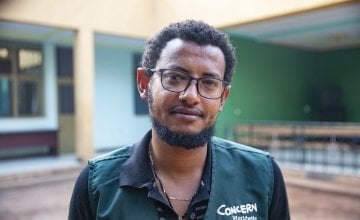
Being a humanitarian very often involves varying degrees of discomfort and frustration. It literally comes with the territory. The Gambella region of Ethiopia is a tough place to work — remote, isolated, lacking infrastructure, and very, very hot. For an Ethiopian highlander, that heat (regularly over 90 degrees) can make life seriously uncomfortable.
But Mesay Woldesenebet and his colleagues at Pugnido Refugee Camp came here to do a job. Tens of thousands of families have crossed the nearby border from South Sudan to take refuge from conflict, and they need help. As Nutrition Team Leader he manages the activities of a team dedicated to identifying and treating cases of child malnutrition. “I have a lot of experience in nutrition and medical practices so I’m ready to contribute what I can.”
At Old Nuer nutrition center, where Mesay works alongside a team of 45 people, he explains that an average of 500 people attend for services every day. For many, this service is all that is keeping severe malnutrition at bay. Why did he choose to work in public health? “I lost my father when I was kid, and before his death, he was bedridden for a long period of time. Because of this, I started to become interested in humanitarian services.”
Samah Zohbi - Lebanon
I was looking for a way to make a difference… and I felt that we could help in maybe creating a functional environment for refugees.
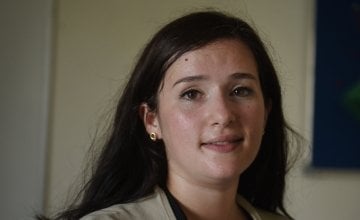
Operating modern humanitarian programmes requires a wide variety of technical expertise, and it’s young professionals like Samah Zogbi who are the beating heart of our emergency response teams. A qualified architect, she previously worked in the private sector, but since joining Concern, her life has taken a very different turn.
Much of Concern’s work with Syrian refugees in Northern Lebanon involves helping them to find secure and appropriate accommodation. Many live in rudimentary shelters or unfinished buildings, with little by way of basic services. The winters here can be especially tough. Samah has the technical knowledge to help — and, as a committed humanitarian, she has the incentive too. “I was looking for a way to make a difference… and I felt that we could help in maybe creating a functional environment for refugees.”
Leading a team of 12 professionals, Samah has developed her own technical and management skills, but the experience has also changed her as a person. “I think I’ve also become more compassionate for vulnerable people since I’m working here. I’m not looking now for expensive things in my life, and don’t think this is a priority in my life anymore because I think that other people are in need of much more… basic things like water and electricity.
Simon Piol - South Sudan
I am happy to help people because if I save lives, they will become great people.
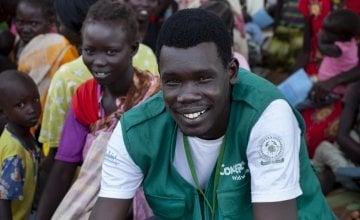
The story of Simon Piol’s journey to being a humanitarian is bittersweet. As a young boy in Southern Sudan, he suffered the consequences of the ongoing conflicts around him, becoming seriously malnourished. It was a Concern team that intervened in his locality, providing food supplies for those in need.
20 years on, Simon works for Concern as a Nutrition Assistant, near to his home village in what is now South Sudan. He’s proud to do the work, but the fact that the need still exists is a sign of wider failures. 60% of the population is food insecure, and as many as 1.4 million children under the age of 5 face hunger.
Simon screens and admits malnourished children to Concern’s CMAM program, which has proven hugely impactful over the past 20 years. Describing his job as “the best thing ever,” Simon is eager to see the program further expanded “If it’s possible, we need to create more [nutrition] sites. This site is not enough.”
Fouzia Mohamed Ali - Somalia
Even when I was in the US, I never really left the sector, first working in a community clinic and then with Seattle’s human services department
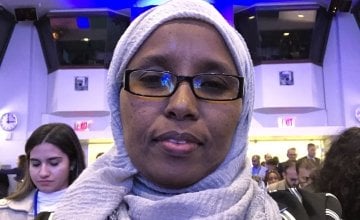
Somalia is an amazing country but it has also been for decades one of the most difficult and dangerous places to be a humanitarian. Fouzia Mohmed Ali knows this well. But she also knows the value that her organisation can bring to the lives of people who face economic and social challenges.
Growing up in Mogadishu, Fouzia saw the privations of war and the impact it had on people who could not access basic healthcare or education services. Fortunate enough to get her own education abroad, she entered the aid sector after graduating. “I wanted to do what little I could to help people get basic services.”
But eventually Fouzia, like many others, was forced to flee her own country in 1998 for the safety of the United States, where she lived and worked for nearly 10 years. In 2017 she went home to Somalia, and today she is Director of Operations for GREDO, a local organisation that numbers Concern among its international partners. “This is a way for Somali communities to decide their own needs. The closer you are to the root of the problem, the closer you are to solving the problem.”
Giro Dima - Kenya
I have learned that you cannot do all the changes that you want over a short period of time. It takes time.
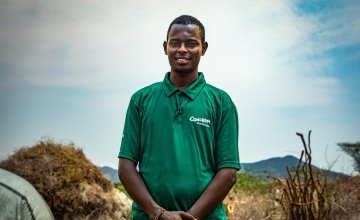
A chance encounter with some college brochures from Aberdeen University in Scotland sparked a deep love for nutrition and dietetics in Giro and led him towards a career as a Health and Nutrition officer with Concern. Having excelled at his studies at the nearby Maseno University, Giro wasted no time in getting to work.
He currently works to support better access to crucial health services for mothers and children under the age of five in the Arid and Semi-arid parts of Kenya. Coming from a large pastoral family himself, Giro knows all too well the challenges facing rural families in Kenya, particularly the obstacles in accessing crucial health care services. He says, “I remember my mother walking long distances in order to reach health centres.”
Over the years and due to climate change, Giro has become more worried about the families living in such parts of Kenya (particularly in Turkana) where climate shocks such as droughts and flooding have become much more frequent. He believes the challenges he has faced so far has made him a more confident, determined, and hard-working humanitarian; "I have learned that you cannot do all the changes that you want over a short period of time. It takes time."
Follow us
Keep up to date with all of our work and hear more stories from our field staff by following us on Instagram.





